

How to Teach Critical Thinking Skills to Young Children. Hello, everybody!
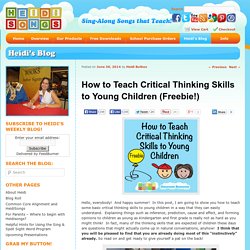
And happy summer! In this post, I am going to show you how to teach some basic critical thinking skills to young children in a way that they can easily understand. Explaining things such as inference, prediction, cause and effect, and forming opinions to children as young as Kindergarten and first grade is really not as hard as you might think! In fact, many of the thinking skills that are expected of children these days are questions that might actually come up in natural conversations, anyhow! I think that you will be pleased to find that you are already doing most of this “instinctively” already. Children must naturally infer many things by looking at pictures in books when they cannot yet read.
If you find that you are already asking most of these types of questions already, then you are doing great! Kids get used to there being just one right answer, and the rest of the answers are wrong. Hypothesize: Take a really smart guess, based on what you already know. Dragonflies in First: Does it Really Take 30 Minutes to Wake Up? Recently a teacher emailed me asking a few questions about my digital plans I post each week.
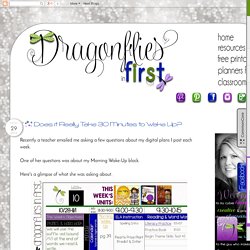
One of her questions was about my Morning Wake-Up block. Here's a glimpse of what she was asking about. She asked how I stretched my Morning Wake-Up time to 30 minutes - and what was I doing while the kids were working on this. Legitimate question. It gives me an opportunity to share with you one of the greatest things I've learned in all my years of teaching ... s.l.o.w. d.o.w.n. I don't mean work slowly.What I mean is - stop making the goal to get through your stack of work you scheduled for the day - but rather make everything meaningful. It wasn't an easy shift. I'm a task person. But that is definitely NOT the way to teach. Giving myself permission (and sometimes simply forcing myself) to SLOW DOWN and wring every speck of learning out of each thing we do in class was a fabulous change for me.
One of the biggest and best "shifts" I made in this area was in correcting work. At this point I say, iFlash. This Blog Saturday, April 12, 2014 iFlash Hello, I am Teresa from www.technologywithclass.com and I am super excited to join the Technology Tailgate team!
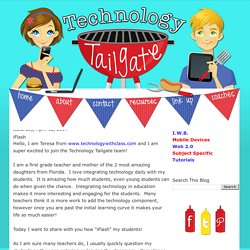
I am a first grade teacher and mother of the 2 most amazing daughters from Florida. I love integrating technology daily with my students. Here is what you do! Posted by Teresa Phillips Email ThisBlogThis! Labels: Freebie, iFlash, Technology with Class 2 comments: AngieApril 13, 2014 at 6:33 PMI love this idea. Load more... Newer PostOlder PostHome Subscribe to: Post Comments (Atom) Mobile Devices Web 2.0 Subject Specific Tutorials Search This Blog Fans Follow this blog Subscribe To Posts Comments Follow by Email Awards/Badges Topics Archive Fonts. HOW DID YOU KNOW THAT? One of the most powerful questions teachers can ask is, “How did you know that?”
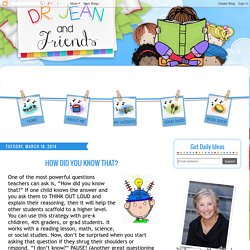
If one child knows the answer and you ask them to THINK OUT LOUD and explain their reasoning, then it will help the other students scaffold to a higher level. You can use this strategy with pre-k children, 4th graders, or grad students. It works with a reading lesson, math, science, or social studies. Now, don’t be surprised when you start asking that question if they shrug their shoulders or respond, “I don’t know?” PAUSE! Here are some other “tips” for asking good questions. Open-ended – Ask open-ended questions, rather than “yes” or “no.” Phrase Questions Clearly – Focus on one aspect at a time. Acknowledge Responses - Avoid judging answers by repeating their response. Probe – Extend students’ thinking by having them clarify an idea or support an opinion.
Give Time - Help children think about what they want to say and provide for individual differences by asking children to smile if they know the answer. 5 Powerful Questions Teachers Can Ask Students. My first year teaching a literacy coach came to observe my classroom.
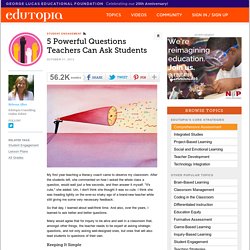
After the students left, she commented on how I asked the whole class a question, would wait just a few seconds, and then answer it myself. "It's cute," she added. Um, I don't think she thought it was so cute. I think she was treading lightly on the ever-so shaky ego of a brand-new teacher while still giving me some very necessary feedback. So that day, I learned about wait/think time.
Many would agree that for inquiry to be alive and well in a classroom that, amongst other things, the teacher needs to be expert at asking strategic questions, and not only asking well-designed ones, but ones that will also lead students to questions of their own. Keeping It Simple I also learned over the years that asking straightforward, simply-worded questions can be just as effective as those intricate ones.